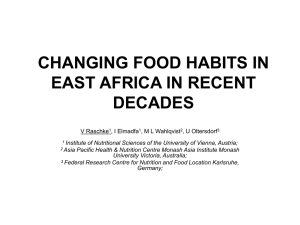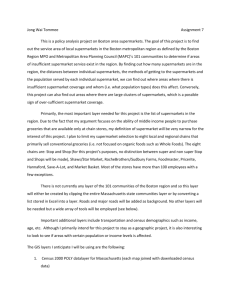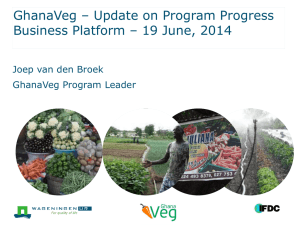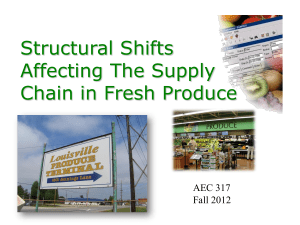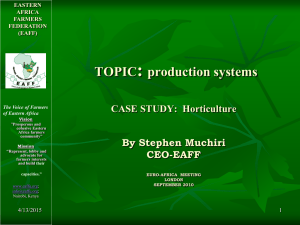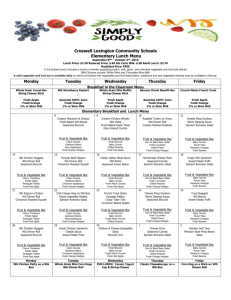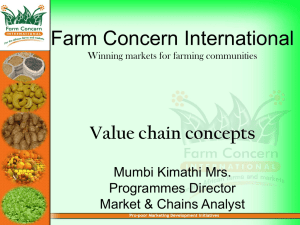A study of supply chain management practices and the
advertisement
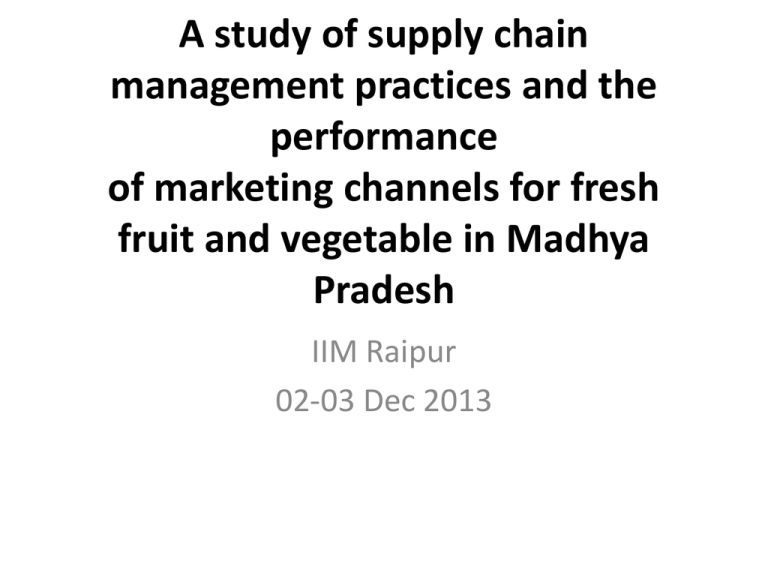
A study of supply chain management practices and the performance of marketing channels for fresh fruit and vegetable in Madhya Pradesh IIM Raipur 02-03 Dec 2013 • Author: *Anurag Shrivastava • The purpose of this study is to investigate how alternative supply chain management practices adopted by leading supermarkets engaged in fresh fruit and vegetable marketing in M.P.impact on the performance of the supply chain. We investigate on-going changes in the supply chain using information from leading supermarkets and related players. The information sheds light on how the new supply chain management policies and procedures have affected the cost structures, long-term profitability and organizational viability of the system. • Madhya Pradesh is the second largest state in the country in terms of area and seventh largest in terms of population. The state has 48 districts. The state is classified as a sub tropical region. Emergence of supermarkets and their explosive growth over the last 10−15 years has profoundly influenced Madhya Prades’s fruit and vegetable marketing system, and the trend is expected to continue into the foreseeable future. • Objective of this study • Identify major changes emerging in Madhya Pradesh fresh fruit and vegetable supply chain system with respect to its organizational and functional aspects; • Establish to what extent the coordination of supply chains and its key partners have contributed to the transformations in the marketing system and their implications on the operational effectiveness; • Identify key policy issues that require the attention of public policy makers for further improving the fresh fruit and vegetable marketing system. • Literature Review • The impact of supermarkets on global and local supply chains and its implications for all actors in the supply chains has received much attention in recent years; e.g. Ghezan et al. (2006), Cadilhon et al. (2006), Neven and Reardon (2004). Cadilhon et al. (2006) use parallel performance measures that are evaluated using data collected through interviews and case studies. Chen et al. (2005) investigate the issue of modern agriculture food systems organization and its effects on fresh fruit and vegetable farmers and traditional marketing systems in Asia. They observe that individual small farmers are unable to compete with larger counterparts. If they are to supply the supermarkets, they will have to work in groups. • Research Methodology • • • • • Research Type Population Sample Area Sample Size Sampling Techniques . : Descriptive : 7,48,658 : Madhya Pradesh : 145 : Random S Sampling • The study is based on data gathered from key supply chain partners in the fresh fruit and vegetable marketing system. Data from supermarkets, mostly involving primary data gathered through interviews and case studies, and data from the traditional supply chains, mostly in the form of secondary data, is used. The dual approach allows researchers to gain a better understanding of the processes involved in the marketing system by combining information within the given context. The study seeks to establish the performance of emerging supply chains and their impact on price levels, cost compositions and functional efficiency. • Findings • With the adoption of economic liberalization policies in the 1994, there have been significant changes in the fresh fruit and vegetable marketing system. Policy changes enabled private sector entrepreneurs and institutions to play an increasingly dominant role in improving supply chain management and the structure and performance of the fresh fruit and vegetable production and marketing system. The change was further supported by a number of factors including increasing per capita incomes, expanding urbanization, shifting food preferences and consumption patterns, and improved communication facilities. • References • • • • • • • Cadilhon, J.-J., Moustier, P., Poole, N.D., Giac Tam, P.T. & Fearne, A.P. 2006. Traditional vs. modern food systems? Insights from vegetable supply chains to Ho Chi Minh City (Vietnam). Development Policy Review, 24(1): 31-49. Chen, K., Shepherd, A.W. & da Silva, C.A. 2005. Changes in food retailing in Asia: implications of supermarket procurement practices for farmers and traditional marketing systems, AGSF Occasional Paper no. 8. FAO, Rome. De Silva, G.A.C. 2006. Crop diversification and marketing. A paper presented at the Council for Agriculture Research Policy (CARP), 15 November 2006, Colombo. Ghezan, G., Mateos, M. & Viteri, L. 2002. Impact of supermarkets and fast-food chains on horticultural supply chains in Argentina. Development Policy Review, 20(4): 389-408. Hector Kobbekaduwa Agrarian Research and Training Institute (HARTI). 2005. A study on marketing on selected fruits in Sri Lanka. HARTI, Colombo. Market analyses 50 Neven, D. & Reardon, T. 2004. The rise of Kenyan supermarkets and the evolution of their horticulture product procurement systems. Development Policy Review, 22(6): 669-699. Perera, M., Kodithuwakku, S. & Weerahewa, J. 2006. Vegetable supply chains of supermarkets in Sri Lanka. A paper presented at the Council for Agriculture Research Policy (CARP), 15 November 2006, Colombo. • Thank You

